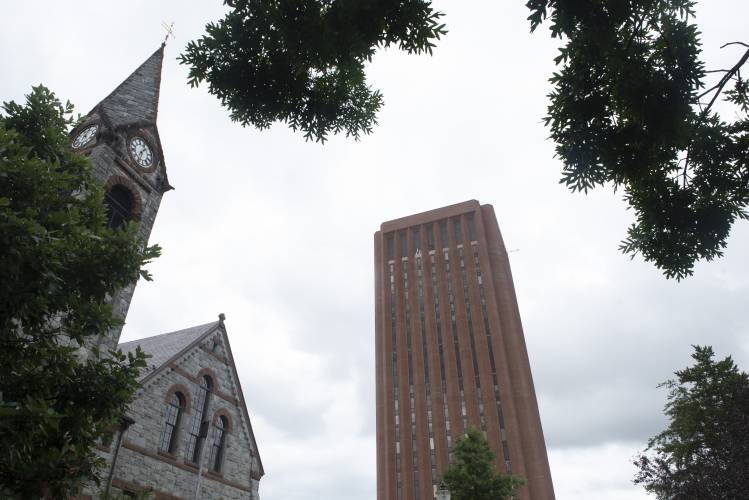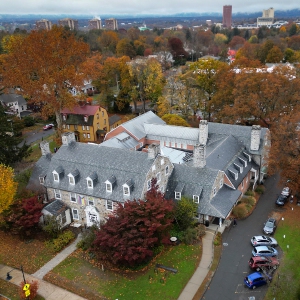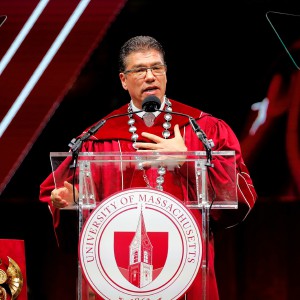UMass trustees OK 2.5% tuition increase

University of Masssachusetts Amherst campus GAZETTE FILE PHOTO
| Published: 04-11-2024 6:24 PM |
BOSTON – The University of Massachusetts has taken a step toward hiking tuition and room and board charges for the next academic year, but some trustees said Wednesday the proposed increases are not high enough and one said the status quo would be equivalent to “running the institution into the ground.”
The UMass Board of Trustees Committee on Administration and Finance voted unanimously on April 3 to increase tuition for in-state undergraduates by 2.5% for the 2024-2025 academic year to $17,006, adding $415 to the bill of a student at the flagship Amherst campus and slightly less at the Boston, Dartmouth and Lowell campuses.
The full board is scheduled to vote to confirm the tuition and fee increases next Wednesday.
Last year, the board also approved a 2.5% increase for the 2023-2024 academic year.
Out-of-state undergraduates at the Amherst campus are facing a 3% increase in tuition, a $1,156 adjustment to $39,693. The system’s three other undergraduate campuses will implement a 2.5% increase for out-of-state students.
Graduate students at Amherst, Boston and Lowell campuses will see a 2.5% rise in their tuition, while the committee voted to raise Dartmouth’s tuition for graduate students only 1%.
Room and board costs are also rising. Students at the Amherst campus will see a 4.5% increase, to $16,128, and the Boston, Dartmouth and Lowell campuses will have room and board fees increase by 2.3%, 3.6% and 3.7% respectively.
The net revenue from the tuition and fee adjustments is projected to be $10 million, according to UMass, “only partially offsetting projected expense increases related to wage, health insurance, financial aid and student support cost increases.”
Article continues after...
Yesterday's Most Read Articles
 Granby Bow and Gun Club says stray bullets that hit homes in Belchertown did not come from its range
Granby Bow and Gun Club says stray bullets that hit homes in Belchertown did not come from its range
 ‘Home away from home’: North Amherst Library officially dedicated, as anonymous donor of $1.7M revealed
‘Home away from home’: North Amherst Library officially dedicated, as anonymous donor of $1.7M revealed
 Super defers Amherst middle school principal pick to successor; one finalist says decision is retaliation for lawsuit
Super defers Amherst middle school principal pick to successor; one finalist says decision is retaliation for lawsuit
 Back to the screen: Amherst authors’ popular ‘Spiderwick Chronicles’ gets a new streaming adaptation
Back to the screen: Amherst authors’ popular ‘Spiderwick Chronicles’ gets a new streaming adaptation
 Annette Pfannebecker: Vote yes for Shores Ness and for Deerfield
Annette Pfannebecker: Vote yes for Shores Ness and for Deerfield
 Sole over-budget bid could doom Jones Library expansion project
Sole over-budget bid could doom Jones Library expansion project
UMass says that its efforts to centralize procurement and other administrative functions has saved $120 million over the last few years, “contributing to its ability to hold tuition adjustments below inflation.”
“The average annual tuition increase over the last five years was 1½%, and … if you use [consumer price index], CPI over that same period was 4.3%. And if you use HEPI, which is the higher education price index, that was 4%. So no matter what measure you look to, we are paying attention to affordability and paying attention to investing in financial aid,” said Lisa Calise, UMass’s senior vice president for administration and finance and treasurer.
“And, in fact, those tuition freezes in ’21 and ’22, the cumulative impact as we sit here today of giving up tuition increases in those two years total $97 million … because we forever let that not be part of our base. And that’s on a base of just under a billion dollars, so it’s material.”
But some trustees said Wednesday that continuing to hold tuition increases below the rate of inflation is not sustainable and they argued for increases in the 3.5% to 4% range instead.
“What I’m going to talk about is about a $10 million increase in revenue in light of the atmosphere of the following: There is no more money coming out of the State House for the next two years, from what I hear, due to the immigration problem. No. 2, you are in the environment of $90,000 private education,” trustee Bob Epstein said. He added: “We’ve got to catch up. And if we keep going, take the CPI against our rising costs, eventually you’re going to be faced with even tougher financial challenges ahead.”
Epstein said he expects that, no matter what amount the board raises tuition by, “there’ll be an article in the Globe, an article maybe in the Herald, about how bad we are” and that “we might as well get it over with, you might as well get a number that we need.”
Trustee Charles Wu said he agreed with Epstein. He said UMass is “behind the eight ball and we’re on the treadmill,” and should be prepared for either “student protests who are unhappy with the tuition increase or faculty or program cuts that we’re going to have to do.”
“So I think it is incumbent on the board to think about – and I agree that it’s a wonderful goal and ideal to keep this very affordable. But I think a 3% or more increase is not unreasonable. I haven’t done the numbers the way Bob did, but just the numbers don’t add up,” Wu said. “Going back to my first question of one and a half percent increases against four and a half percent inflation, we’re just going to be running the institution into the ground.”
UMass President Marty Meehan, who has been warning of impending financial headwinds for the university system for at least a year, said Wednesday that the topic of how tuition rates factor into the system’s overall fiscal picture is ripe for further discussion. The 2.5% increase that was adopted was recommended by Meehan.
“Obviously, this proposal is what the chancellors and I, what we felt was the right number. But I’m certainly not going to disagree with the perspectives of the two trustees. And it is a very reasonable — look, as long as we provide financial aid, I don’t think that our sticker cost is too high at all. In fact, I worry sometimes that students don’t come to UMass because the sticker price is so low, they worry that maybe it’s not as good as someplace else,” Meehan said. “But obviously, we put this proposal through because we felt it was the lowest that we could survive with.”
Trustee Steve Tolman, the former head of the state AFL-CIO, said he thought raising tuition any higher than 2.5% would be “a bad look,” especially for the people who are already struggling to afford college costs.
“That’s what financial aid is for,” Wu responded. “For those people who can’t afford it, we can give them more financial aid so they’re indifferent. But for the people who can afford it, and certainly foreign students coming over, we can increase that and they would probably be indifferent.”
Epstein agreed to drop his motion to have the committee consider a greater tuition increase after Chairman Michael O’Brien said he would make it a priority to continue the conversation through the summer and fall as the university system plans for next year’s tuition rates.
“When you think about it intellectually and fiduciarily, there’s no question that we are between a rock and a hard place. And there’s no way that this is sustainable, what we’re doing,” O’Brien said.
Through increases in financial aid and freezing tuition during the COVID-19 pandemic, university officials say they have been able to hold student debt flat in real dollars. Average post-graduation debt was $31,404 in fiscal 2019, compared to $31,173 in fiscal 2024, according to UMass. If average debt had grown at the rate of inflation, it would be $39,549.
University-generated financial aid increased by $14 million over fiscal 2023 to $409 million. This represents an 82 percent increase over the last decade, while tuition and fees increased by 32 percent.
A report from the higher education nonprofit The Hildreth Institute last year found that MASSGrant, the state’s primary tool for providing need-based financial aid, has shrunk in its impact over the past few decades in the face of tuition increases and higher demand. In 1998, the aid covered about 80% of tuition and fees at public universities. As of last year, it covered only 8% of tuition and fees for UMass students and 11% for state university students, the report said.
Since that report came out, lawmakers and Gov. Maura Healey agreed to an expansion of MASSGrant Plus this academic year to provide aid to students with the highest needs.
The $62 million infusion in the program brought its total impact to $84 million – up from its $7.5 million start under former Gov. Charlie Baker – paid for by the income surtax on the state’s highest earners approved in 2022.
The governor said last fall that a third of all UMass students would qualify for free tuition under the program’s expansion.

 Sharing a few notes: High schoolers coaching younger string players one on one
Sharing a few notes: High schoolers coaching younger string players one on one Reyes takes helm of UMass flagship amid pro-Palestinian protests
Reyes takes helm of UMass flagship amid pro-Palestinian protests Amherst poised to hire police department veteran as new chief
Amherst poised to hire police department veteran as new chief 